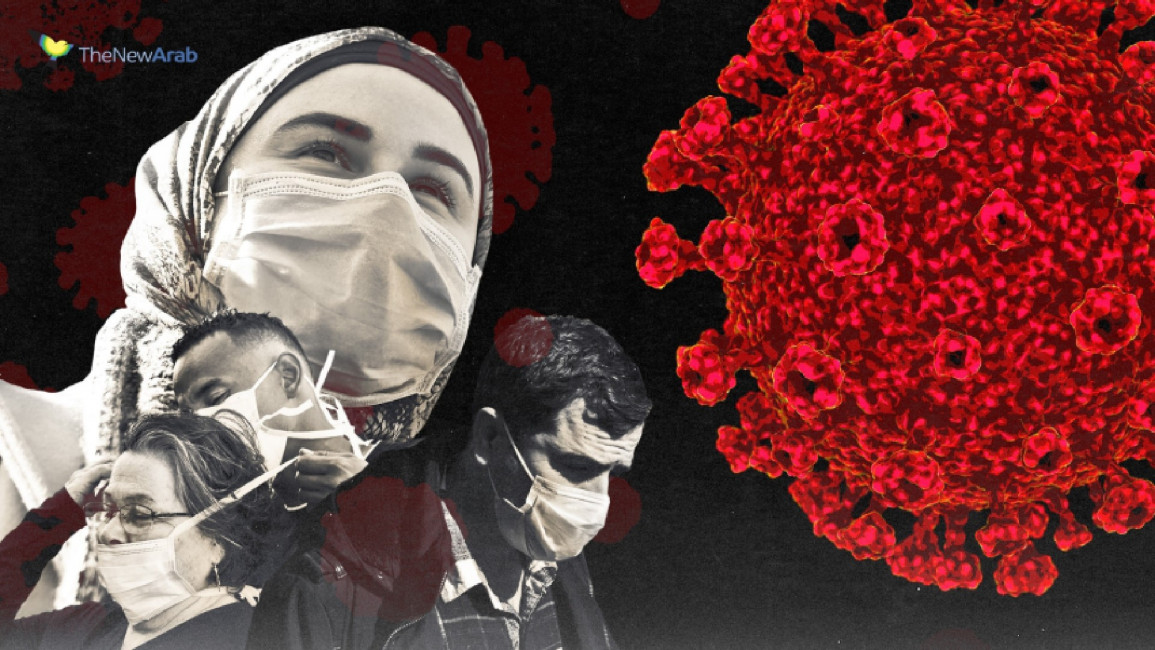The Middle East at war with coronavirus: Top stories from 4 May
1. Kuwait breaks up 'riot' by Egyptian workers demanding repatriation amid pandemic
Kuwaiti authorities dispersed a "riot" by Egyptian workers who demonstrated on Monday to demand repatriation amid the coronavirus crisis, state media said.
Such protests are rare in the tightly controlled Gulf countries, where there is a large population of foreign workers.
Security forces intervened to halt "riots and chaos" at a housing area for foreign workers, detaining an unspecified number of people, according to the official Kuwait News Agency (KUNA).
On Sunday, KUNA quoted Egyptian ambassador to Kuwait Tareq al-Qooni as saying that Egyptians at a camp for immigration offenders will be repatriated starting "this week".
"The first flights will be for women and children who are kept in special housing units," Qooni reportedly said.
Kuwait has said it will allow expatriates in violation of residency laws to leave the Gulf country without paying fines or for plane tickets.
Millions of foreigners across the wealthy Gulf nations face uncertainty amid the coronavirus crisis, with many workers sick and countless others unemployed, unpaid and at the mercy of unscrupulous employers. Read more here.
 |
| Click to enlarge |
2. Iran reopens mosques, records almost 80,00 hospital recoveries
Iran on Monday reopened mosques in parts of the country deemed at low risk from coronavirus, as it said almost 80,000 people hospitalised with the illness had recovered and been released.
Health ministry spokesman Kianoush Jahanpour said 74 new fatalities brought to 6,277 the total number officially recorded in Iran since it reported its first cases in mid-February.
Iran on Sunday recorded 47 deaths, its lowest daily count in 55 days.
Another 1,223 cases of Covid-19 infections were recorded in the past 24 hours, Jahanpour said, raising the total to 98,647.
Mosques were Monday allowed to reopen to worshippers in 132, or around a third, of Iran's administrative divisions which are considered low-risk. Read more here.
3. Dubai Expo 2020 delayed
Dubai's Expo 2020 world's fair will be delayed to October 1, 2021, over the new coronavirus pandemic, a Paris-based body behind the events said on Monday.
Members of Bureau International des Expositions had been voting on the requested delay for days, with a final tally expected by the end of May.
On Monday, however, the bureau said a required two-thirds of the countries in the organisation had voted to approve the delay, meaning it would be granted.
The bureau's executive committee voted unanimously in April to back the proposal.
Dubai, a sheikhdom in the United Arab Emirates, has bet billions of dollars on the event to rejuvenate its troubled economy. Read more here.
Read also: War-torn Yemen faces shocking 16 million coronavirus cases, UN warns
4. Lebanon eases some lockdown measures
Lebanon entered a new phase of the lockdown on Monday, allowing, barber shops, car showrooms and restaurants to open at 30 percent capacity during the day.
But many business owners say they won't reopen because they would be losing more money if they operate under such restrictions during a faltering economy.
The lockdown topped months of a spiralling economic crisis that already had a staggering impact on the hospitality industry, a resilient sector in this small Mediterranean country that survived political instability and contributed as much as 18 percent of the GDP in 2017, a peak year.
Around 800 small and medium businesses have folded between September and January, according to Maya Bekhazi, secretary general of the syndicate for owners of restaurants, cafe and bars.
"The guidelines, that were imposed in order to reopen (the restaurants) after the coronavirus, enforce us to open with 30% of occupancy," she said.
These measures "cannot compensate the losses of the restaurant," Bekhazi added. Read more here.
5. Hollywood artist tutors Arabic-speaking kids during pandemic
Like other regions across the world, young children in the Middle East were confined at home because of the Covid-19 pandemic, but there was not nearly enough original content online in Arabic to keep them entertained, such as fun tutorials and other activities.
So Ali Adeeb, a Syrian-born animation artist who works at Warner Bros. Entertainment in Los Angeles, and her sister Sandi, a university lecturer of pharmaceutics in Qatar, decided to take matters into their own hands.
The pair set up "Susupreemo," a YouTube channel designed to help Arabic-speaking kids - and their stressed-out parents - weather the coronavirus lockdowns through basic tutorials on drawing, making origami or simply reading children's books, all in Arabic.
"The idea is to create videos to engage the kids," said Ali Adeeb, who at Warner Bros. has worked on children's shows including "Green Eggs and Ham," a Netflix animated series based on the Dr. Seuss classic.
"There's tons of content on the web in English for kids but there is not enough original content in Arabic," added the 34-year-old who is now working from home on the second season of the Netflix show. Read more here.
Follow us on Facebook, Twitter and Instagram to stay connected



